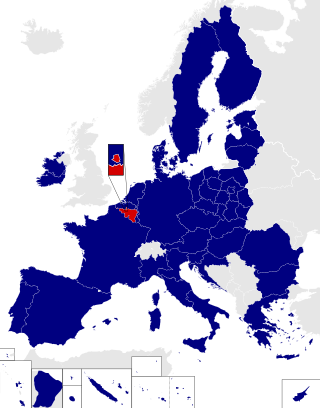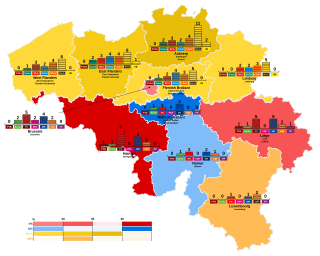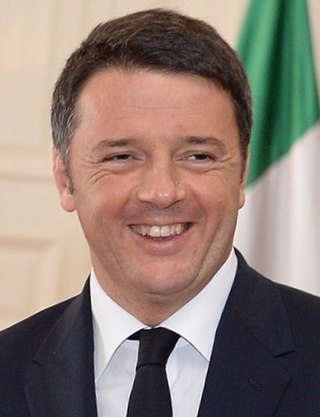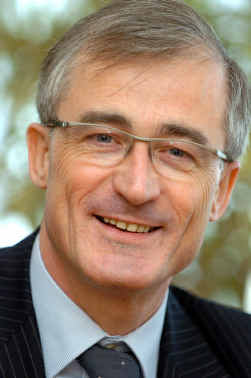
The additional-member system (AMS) is a mixed electoral system under which most representatives are elected in single-member districts (SMDs), and the other "additional members" are elected to make the seat distribution in the chamber more proportional to the way votes are cast for party lists. It is distinct from parallel voting in that the "additional member" seats are awarded to parties taking into account seats won in SMDs, which is not done under parallel voting.

Mixed-member proportional representation is a mixed electoral system which combines local majoritarian elections with a compensatory tier of party list votes, which are used to allocate additional members in a way that aims to produce proportional representation overall. In most MMP systems, voters get two votes: one to decide the representative for their single-seat constituency, and one for a political party. Some countries use single vote variants of MMP, although this article focuses primarily on dual vote versions of MMP.

The 2004 European Parliament election was held between 10 and 13 June 2004 in the 25 member states of the European Union, using varying election days according to local custom. The European Parliamental parties could not be voted for, but elected national parties aggregated in European Parliamental parties after the elections.

Open list describes any variant of party-list proportional representation where voters have at least some influence on the order in which a party's candidates are elected. This is as opposed to closed list, in which party lists are in a predetermined, fixed order by the time of the election and gives the general voter no influence at all on the position of the candidates placed on the party list.

Elections to the European Parliament take place every five years by universal adult suffrage; with more than 400 million people eligible to vote, they are the second largest democratic elections in the world after India's.
At a national level, Greece holds elections for its legislature, the Hellenic Parliament.

Romania elects on a national level a head of state – the president – and a legislature. The president is elected for a five-year term by the people. The Romanian Parliament has two chambers. The Chamber of Deputies has currently 330 members, elected for a four-year term by party-list proportional representation on closed lists. The Senate has currently 136 members, elected for a four-year term by party-list proportional representation on closed lists.

Elections in Belgium are organised for legislative bodies only, and not for executive functions. Direct elections take place for the European Parliament, the Chamber of Representatives, the Parliaments of the Regions, the Parliaments of the Communities, the provincial councils, the municipal councils and the councils of Districts of Antwerp. Voting is mandatory and all elections use proportional representation which in general requires coalition governments.

Malta elects on a national level 6 MEPs representing Malta in the European Parliament, on a district level the legislature, on a local level the local councils, and on a community level the Administrative Committees.

Members of the European Parliament (MEPs) are elected by the population of the member states of the European Union (EU). The European Electoral Act 2002 allows member states the choice to allocate electoral subdivisions or constituencies for the European Parliament elections in several different ways.

The French-speaking electoral college is one of three constituencies of the European Parliament in Belgium. It currently elects 8 MEPs using the D'Hondt method of party-list proportional representation. It elected 9 MEPs until the 2007 accession of Bulgaria and Romania.

The 2009 European Parliament election in Italy was held on Saturday 6 and Sunday 7 June 2009, as decided by the Italian government on 18 December 2008. Italy elected 72 members of the European Parliament (MEPs).
Pirate Party is a label adopted by certain political parties around the world. Pirate parties support civil rights, direct democracy or alternatively participation in government, reform of copyright and patent laws to make them more flexible and open to encourage innovation and creativity, use of free and open-source software, free sharing of knowledge, information privacy, transparency, freedom of information, free speech, anti-corruption, net neutrality and oppose mass surveillance, censorship and Big Tech.

The 2014 European Parliament election was the United Kingdom's component of the 2014 European Parliament election, held on Thursday 22 May 2014, coinciding with the 2014 local elections in England and Northern Ireland. In total, 73 Members of the European Parliament were elected from the United Kingdom using proportional representation. England, Scotland and Wales use a closed-list party list system of PR, while Northern Ireland used the single transferable vote (STV).

Federal elections were held in Belgium on 25 May 2014. All 150 members of the Chamber of Representatives were elected, whereas the Senate was no longer directly elected following the 2011–2012 state reform. These were the first elections held under King Philippe's reign.

An election was held on 25 May 2014 in the three Belgian constituencies to elect the Belgian delegation to the European Parliament. This election, part of the 2014 European Parliament election, was held on the same day alongside the Belgian federal election and the Belgian regional elections.

The 2014 European Parliament election in Italy took place on 25 May 2014. Italy elected 73 MEPs out of 751 European Parliament seats.

The 2019 Belgian regional elections took place on Sunday 26 May, the same day as the 2019 European Parliament election as well as the Belgian federal election.

An election was held on 26 May 2019 in the three Belgian constituencies to elect the Belgian delegation to the European Parliament. It was part of the 2019 European Parliament election.

The 2024 European Parliament election in Belgium is currently being held on 9 June 2024 in the three Belgian constituencies to elect the Belgian delegation to the European Parliament. It is part of the 2024 European Parliament election and the 2024 Belgian elections. It will be the tenth European Parliament election held in Belgium, and the first to take place after Brexit.



















